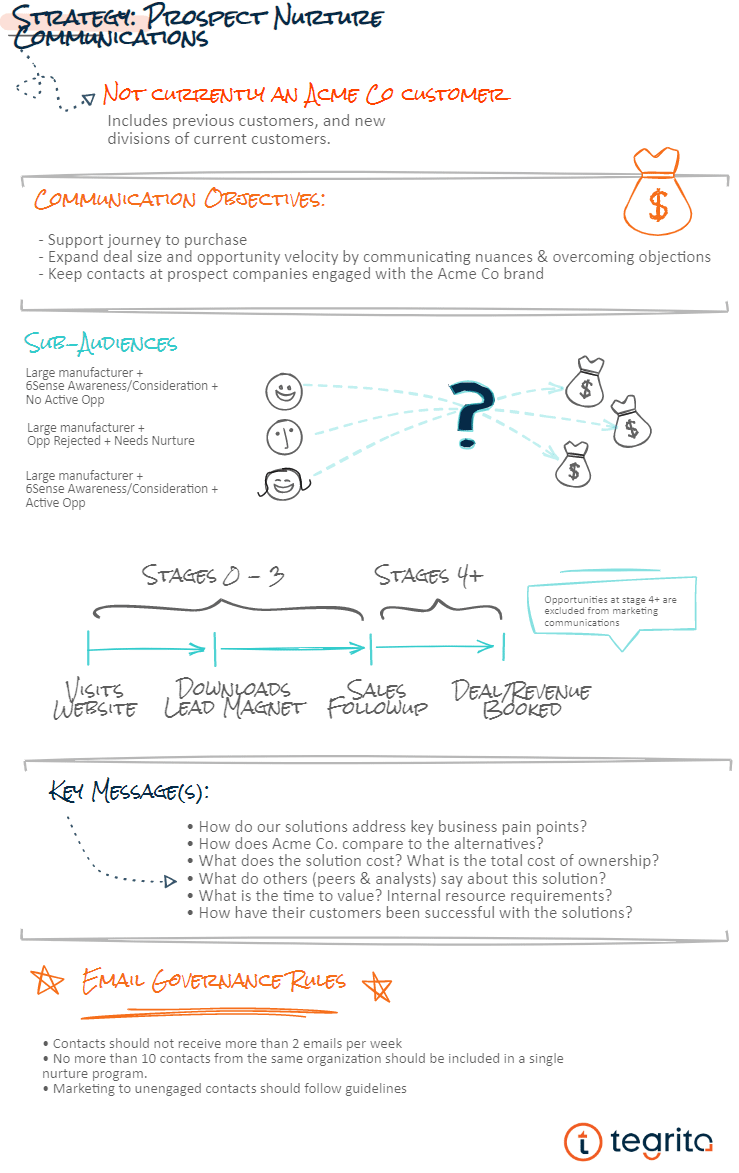Any head of marketing looking to create an effective marketing strategy should leverage email as a critical component. Email is the backbone of any effective marketing strategy, and all other channels ultimately lead to email.
However, a successful email marketing strategy comes with a list of dos and don'ts. This article will discuss the role of email in marketing, as well as the importance of documenting and communicating your strategy. Following these tips, you can create an email strategy to help your business achieve its digital marketing goals.
Defining the role of email in your marketing strategy
To ensure your email marketing is effective, you must first understand how email fits into your overall marketing strategy. In our article The Role of Email in Digital Marketing Success, we offer the benefits of email marketing and guidance on defining the role of email in your strategy.
Our piece, Marketing Map of Influence, will also inform you of how to connect your tactics and channels. If you still need to read that article, we encourage you to. Once you've defined the role of email, you can start to develop your email marketing strategy.
The Do's of Defining Your Email Marketing Strategy
Do define your strategy by your audience. Begin by defining the various scenarios where you intend to leverage email; this often includes following up with new contacts, nurturing prospects, cross-selling current customers, and f sales enablement.
Do identify your target audience indicators. All stakeholders must clearly understand who is (or isn't) a part of each audience. There should be no ambiguity. For example, if you are defining a strategy for prospect nurturing programs, does that only include accounts that have never purchased from you? Or those who aren't current customers? Does the answer change if it's a new division or region from an existing customer? The answers to these questions will vary from one organization to another.
Do establish your communication objectives. A well-worn cliche says, "if it doesn't make dollars, then it doesn't make sense." Applied to this context, if there isn't a business purpose for communicating, we shouldn't. Communication objectives are vital to an email strategy and serve as the foundation for establishing KPIs to measure email as a channel.
Do outline key messages for your audience. In general, each program contains key messaging. However, establishing a baseline for what information to communicate to each audience is essential. The messaging should be high-level enough to apply to all email programs planned for the target audience and tailored sufficiently to be unique to that specific audience.
Do consider other communication channels. Other channels are likely sending targeted communications to each of your audiences that you still need to consider. These channels might include emails from other departments (e.g. sales or customer success), outbound calls from BDRs, SMS, etc. If you plan on using email as part of a more extensive marketing campaign, you must ensure that your message is consistent (or at least not conflicting) across all channels. You must also avoid inundating contacts with communications; instead, your email strategy should consider all outbound messaging.
Do hyper-segment your audience. While developing strategies is often based on your organization’s broad audiences, your communications should be hyper-targeted. These sub-segments are defined and considered when planning programs and messaging. By focusing our communications on specific groups of people, you can better connect with your target audience and generate a higher level of engagement.
The Don'ts of Defining Your Email Marketing Strategy
Don't be too specific. Defining the role of email in your marketing strategy serves as the north star for all email programs. The strategy sets the direction, but each email program will have its own requirements. Your strategy needs to be clear without being too granular.
Don't get overzealous. Email is only a go-to communication method for some scenarios; therefore, defining use cases where email isn't an ideal communication channel is essential. For example, if sales have obvious outreach sequences and a strong sales team, there may be better options for prospect nurturing than email marketing.
Don't overlook technical capabilities. The role email plays in marketing, the robustness of your strategy, and how email marketing gets executed depend on the technology in your MarTech stack. For example, marketing automation platforms and the artificial intelligence (AI) built into other tools directly impact when, where, and how you will use email.
Don't forget you need data. When defining your audiences and email strategy, you must always consider your available data. You can't target based on data points that don't exist, or that you don't have access to. To target the right audience, you must always consider what data is available and what data is relevant.
By following these tips, you'll be on your way to creating a successful email marketing strategy.
Documenting and communicating your email marketing strategy
Finally, it's essential to document and communicate your strategy clearly. Email marketing can be complex, so it's important to have a clear plan before you get started. By documenting your strategy, you can ensure that everyone is on the same page and aligned with your organization's goals.
An approach we recommend is composing an email marketing playbook for documenting and sharing your strategy. Your email marketing strategy playbook should include your goals, objectives, target audience, key messages, common call-to-action, and email governance rules. As a reminder, this document serves as a guide (or north star) for your team. It should be comprehensive and detailed enough that everyone understands the strategy, but it should also be flexible enough to apply to all programs.
The example below is a modified snippet from a strategy I developed for a Tegrita client. This snippet is specific to their strategy for email marketing to prospects. I have also included an example of their email governance rules below the snippet.
Once you have documented your email marketing strategy, it's essential to communicate it to all relevant parties. Key stakeholders include anyone who is involved in executing the campaign, such as designers, copywriters, and developers. You should also set up clear rules and guidelines for running campaigns. These rules should cover elements such as frequency of emails, length of emails, subject lines, call to actions, and design elements. By having these rules in place from the start, you will find it easier to manage the campaign and avoid any potential future problems.
Getting started defining your email marketing strategy
Does your team have a documented strategy for how and when to use email? Many businesses benefit from having a 3rd party strategist to facilitate the strategy session. If you need assistance with your email marketing strategy, we are happy to help. Feel free to reach out to the Tegrita team and mention that you read this article. Happy email strategizing!
About the Author
Follow on Twitter Follow on Linkedin Visit Website More Content by Brandi Starr




